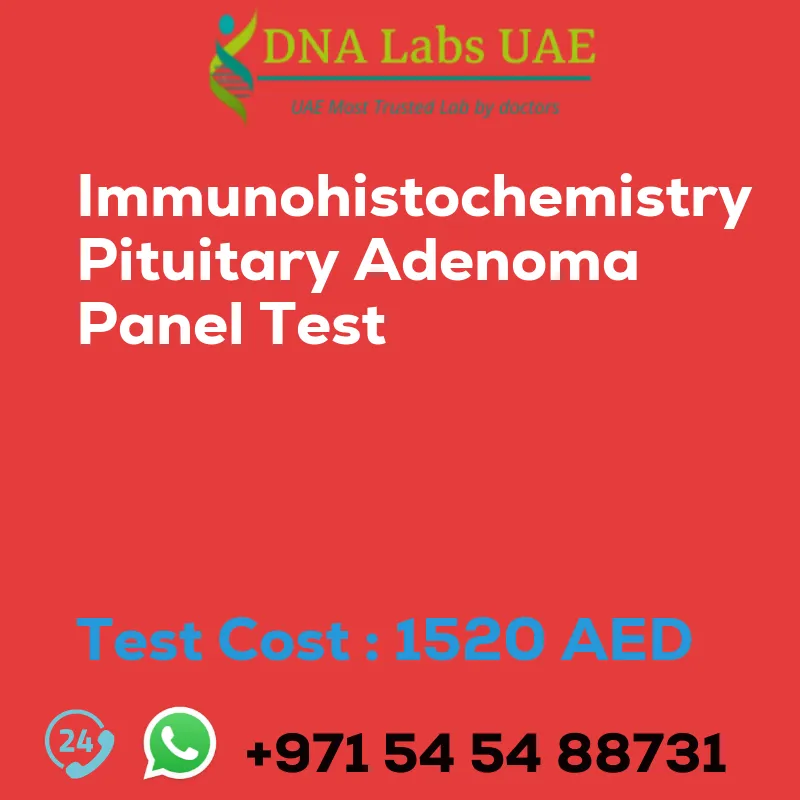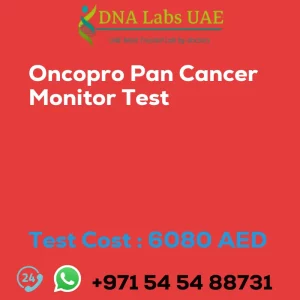IMMUNOHISTOCHEMISTRY PITUITARY ADENOMA PANEL Test
Test Cost: AED 1520.0
Symptoms, Diagnosis, and Referring Details:
Test Name: IMMUNOHISTOCHEMISTRY PITUITARY ADENOMA PANEL Test
Components: ACTH, FSH, GH, Ki67, LH, LMWCK, P53, Prolactin, Reticulin, TSH
Price: AED 1520.0
Sample Condition:
Submit tumor tissue in 10% Formal-saline or Formalin fixed paraffin embedded block. Ship at room temperature. Provide a copy of the Histopathology report, Site of biopsy, and Clinical history.
Report Delivery:
Sample Daily by 6 pm; Report Block: 5 days; Tissue Biopsy: 5 days; Tissue large complex: 7 days
Method:
Immunohistochemistry
Test Type:
Cancer
Doctor:
Oncologist, Pathologist
Test Department:
HISTOLOGY
Pre Test Information:
Provide a copy of the Histopathology report, Site of biopsy, and Clinical history.
Test Details:
The Immunohistochemistry Pituitary Adenoma Panel test is a diagnostic test used to identify and classify different types of pituitary adenomas. Pituitary adenomas are tumors that develop in the pituitary gland, a small gland located at the base of the brain.
The panel includes a series of immunohistochemical stains that are used to detect specific proteins or hormones in the tumor tissue. These stains help to determine the type of pituitary adenoma present and can provide valuable information for treatment planning.
The panel typically includes stains for hormones such as prolactin, growth hormone, adrenocorticotropic hormone, thyroid-stimulating hormone, follicle-stimulating hormone, luteinizing hormone, and alpha-subunit. Additional stains may be included depending on the suspected type of adenoma.
The test is usually performed on a tissue sample obtained through a biopsy or surgical resection of the tumor. The tissue sample is processed, embedded in paraffin, and cut into thin sections. These sections are then stained with specific antibodies that bind to the target proteins or hormones.
The results of the Immunohistochemistry Pituitary Adenoma Panel test can help guide treatment decisions, as different types of pituitary adenomas may require different treatment approaches. For example, some adenomas may be treated with medication, while others may require surgical removal or radiation therapy.
It is important to note that the test results should be interpreted by a pathologist with expertise in pituitary tumors, as the interpretation can be complex and requires knowledge of the specific staining patterns associated with different adenoma types.
| Test Name | IMMUNOHISTOCHEMISTRY PITUITARY ADENOMA PANEL Test |
|---|---|
| Components | *ACTH*FSH*GH*Ki67*LH*LMWCK*P53 *Prolactin*Reticulin*TSH |
| Price | 1520.0 AED |
| Sample Condition | Submit tumor tissue in 10% Formal-saline OR Formalin fixed paraffin embedded block. Ship at room temperature. Provide a copy of the Histopathology report, Site of biopsy and Clinical history. |
| Report Delivery | Sample Daily by 6 pm; Report Block: 5 days Tissue Biopsy: 5 days Tissue large complex : 7 days |
| Method | Immunohistochemistry |
| Test type | Cancer |
| Doctor | Oncologist, Pathologist |
| Test Department: | HISTOLOGY |
| Pre Test Information | Provide a copy of the Histopathology report, Site of biopsy and Clinical history. |
| Test Details |
The Immunohistochemistry Pituitary Adenoma Panel test is a diagnostic test used to identify and classify different types of pituitary adenomas. Pituitary adenomas are tumors that develop in the pituitary gland, a small gland located at the base of the brain. The panel includes a series of immunohistochemical stains that are used to detect specific proteins or hormones in the tumor tissue. These stains help to determine the type of pituitary adenoma present and can provide valuable information for treatment planning. The panel typically includes stains for hormones such as prolactin, growth hormone, adrenocorticotropic hormone, thyroid-stimulating hormone, follicle-stimulating hormone, luteinizing hormone, and alpha-subunit. Additional stains may be included depending on the suspected type of adenoma. The test is usually performed on a tissue sample obtained through a biopsy or surgical resection of the tumor. The tissue sample is processed, embedded in paraffin, and cut into thin sections. These sections are then stained with specific antibodies that bind to the target proteins or hormones. The results of the Immunohistochemistry Pituitary Adenoma Panel test can help guide treatment decisions, as different types of pituitary adenomas may require different treatment approaches. For example, some adenomas may be treated with medication, while others may require surgical removal or radiation therapy. It is important to note that the test results should be interpreted by a pathologist with expertise in pituitary tumors, as the interpretation can be complex and requires knowledge of the specific staining patterns associated with different adenoma types. |








